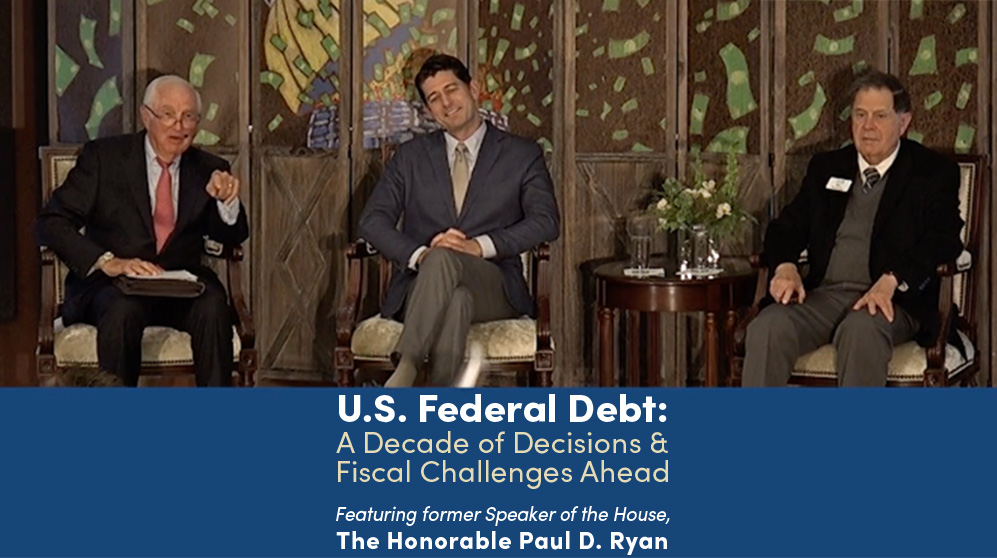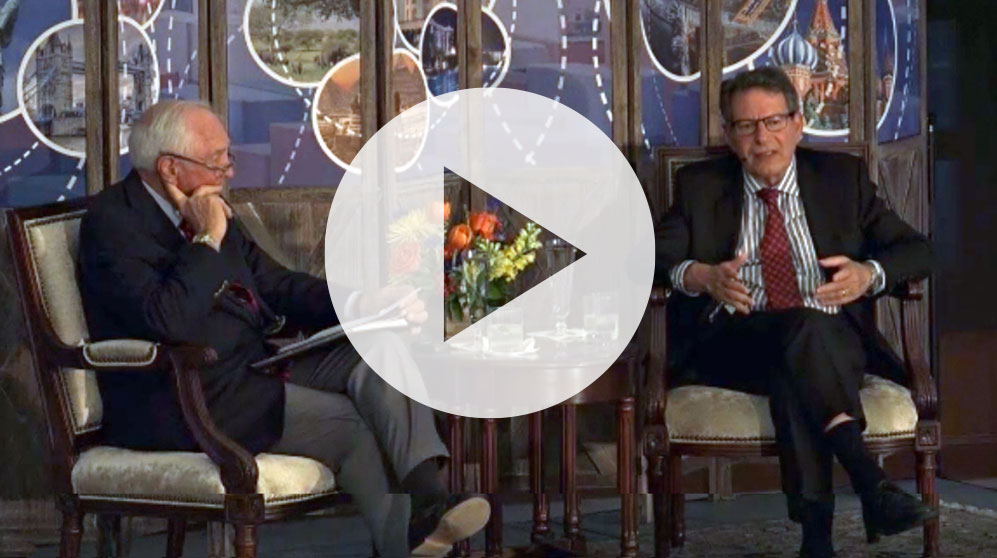U.S. Federal Debt: A Decade of Decisions & Fiscal Challenges Ahead
• 6 min read

Get the latest in Research & Insights
Sign up to receive an email summary of new articles posted to AMG Research & Insights.

U.S. debt has risen for decades, with the trajectory steepening dramatically in the last 15 years. While politicians have talked about the need to “tackle the drivers of debt,” it likely will take a painful exogenous market shock – one like the 2008 housing crisis or an event in the bond markets – to compel meaningful legislative action and spending reforms. This isn’t a rosy picture for the future.
Paul Ryan, former speaker of the U.S. House of Representatives, delivered that somber forecast to AMG clients earlier this month during a presentation titled U.S. Federal Debt: A Decade of Decisions & Fiscal Challenges Ahead.
But he also brought a message of hope, contending that if we start to seriously discuss our debt problem and possible solutions, come to a consensus and take action, it can lead to a great new chapter in American history.
Ryan, 53, served 20 years in Congress as a Republican from Wisconsin and was speaker from 2015 until leaving public service in 2019. He was a candidate for vice president in 2012. Today, he is a partner at Solamere Capital, serves on several corporate and nonprofit boards, and is a professor at the University of Notre Dame.
As a congressman, Ryan was a self-proclaimed deficit hawk, and he remains one today, seeing the burgeoning U.S. debt as an existential threat to American prosperity.
The U.S. debt held by the public stands at $26.3 trillion today, which is equivalent to about 98% of America’s projected annual GDP. That’s up from $5.8 trillion and 40.5% of GDP in 2008. If government spending follows its current path, the Congressional Budget Office (CBO) estimates the debt will soar to 180% of GDP by 2050.
Well over half that ballooning debt will be incurred by government-funded Social Security, Medicare and Medicaid programs that care for retiring Baby Boomers, the 76 million Americans born between 1946 and 1964.
That, Ryan said, coupled with elevated inflation and higher interest rates that must be paid to service the debt is already starting to constrain U.S. economic potential.
“You can’t tax your way out of this,” he said, suggesting that raising taxes alone cannot fix the looming crisis.
That’s only a small part of what needs to be done, Ryan argued. The federal government cannot possibly pay off the upcoming tidal wave of debt without massively debasing the currency, which could wipe out the savings and purchasing power of the American people.
America could easily fall into a “lost generation” in which income mobility, economic growth, and innovation slow to a crawl, he said. It would be the first generation to be financially worse off than their parents.
He suggested that only a multi-pronged attack to balance the budget can possibly save America from potential disaster. The issue is that most politicians don’t want to address the problem because changes to Social Security and Medicare scare people who use the programs, and this group makes up nearly 25% of all voters.
“They’re afraid of blowback,” Ryan said.
First and foremost, he contended, politicians on both sides of the aisle in Washington, D.C., need to wake up and rein in the government’s massive deficit-spending spree and start chipping away at the national debt.
And the only way to do that in a meaningful way, Ryan contended, is to reweave the country’s social safety net that promises all Americans health and retirement security, primarily through Social Security, Medicare, and Medicaid. Those programs are projected to consume 15.2% of GDP by 2052, according to the CBO. By comparison, the average annual cost of the entire federal government from 1972 to 2022 totaled 20.8% of GDP.
Possible solutions, he said, are included in an American Enterprise Institute book he co-edited and wrote the introduction. The collection of essays is titled American Renewal: A Conservative Plan to Save the Country’s Finances and Strengthen the Social Contact. It can be read or downloaded for free at https://www.americanrenewalbook.com/.
Reforming Social Security is the simplest fix, Ryan said, pointing out the programs started in 1935 when the average American male could expect to live about 63 years, which is why the retirement age was set at 65. Today, that average life expectancy is 79 years. Ryan proposed that Congress should gradually raise the retirement age over time—one month every two years—while boosting Social Security taxes and revising means testing and wage indexing.
Medicare reform will be more difficult.
“This is the biggest driver of our debt … and the fastest growing,” Ryan said.
Ryan contends that the key to containing Medicare’s costs is to bring more choice and competition to the system. To do this, he said, Congress needs to convert Medicare to a premium-support system that works like the Federal Employee Health Benefits Program that all government workers, including elected officials, have access to.
“This effectively builds on the popular Medicare Advantage program that seniors enjoy today,” Ryan wrote in his book. “By combining the hospital insurance and supplementary medical insurance trust fund into a single Medicare Trust Fund and adding a means-testing feature to the premium support, in which the wealthy shoulder more of the premium burden than low- and middle-income seniors do, these reforms would deliver substantial savings over the long term.”
“This in turn would bring substantial relief to our fiscal burden.”
If America can just start to address the debt problem and bend the debt curve so it peaks in the 2040s, “this will be an awesome century.” Ryan said.
He urged all voters to take up the cause: “You have got to get serious on these issues, bone up on these issues and push your politicians, go to their events, go to their town halls … ask them what they are going to do about this.”
“And then I’d say save money for your retirement” in case it doesn’t work out.
SEE OTHer AMG EVENTS
AMG events and webinars bring clients together with thought leaders on issues in the financial world and beyond. For a list of our upcoming events, or to view past events, please visit our events page.
This information is for general information use only. It is not tailored to any specific situation, is not intended to be investment, tax, financial, legal, or other advice and should not be relied on as such. AMG’s opinions are subject to change without notice, and this report may not be updated to reflect changes in opinion. Forecasts, estimates, and certain other information contained herein are based on proprietary research and should not be considered investment advice or a recommendation to buy, sell or hold any particular security, strategy, or investment product.
Get the latest in Research & Insights
Sign up to receive a weekly email summary of new articles posted to AMG Research & Insights.




